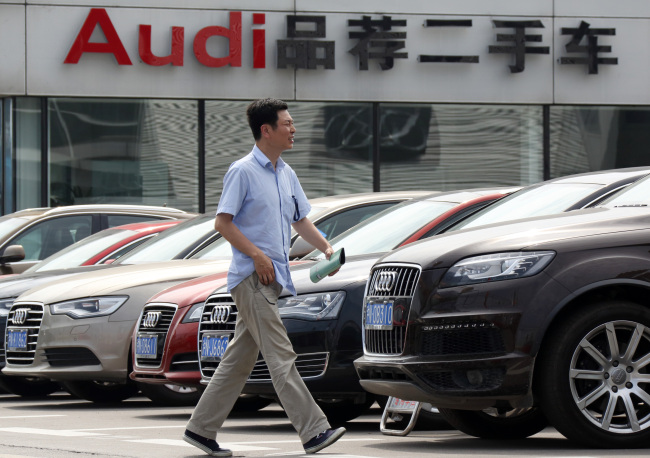China’s antitrust crackdown signals a new era of regulatory scrutiny in the country and threatens to end the days when products from Audi sedans to Starbucks lattes generate fatter profits in Beijing than in London or New York.
In the past month, Chinese antitrust authorities pressured at least seven carmakers to cut prices and raided the offices of software maker Microsoft Corp. The companies join Qualcomm Inc., Caterpillar Inc., Mead Johnson Nutrition Co. and Danone among foreign-owned businesses that have fallen under anti-monopoly scrutiny in China since last year.
The probes, combined with signs the government is shunning some U.S. technology companies for security reasons, have left foreign businesses struggling to figure out the evolving laws and regulations in the world’s most populous country. Those seeking to adapt face the challenge of interpreting vague rules in an economy that’s no longer as reliant on foreign investment as in past decades.
 |
A man walks past Audi vehicles displayed at a dealership in Shanghai. (Bloomberg) |
“We may be seeing a paradigm shift where the rules of the game are changing,” said David Loevinger, former U.S. Treasury Department senior coordinator for China affairs and now an analyst at TCW Group Inc. in Los Angeles. “Until people figure out the new rules it will create a much more uncertain business climate.”
Volkswagen AG’s Audi, Bayerische Motoren Werke AG, Daimler AG’s Mercedes-Benz, Tata Motors Ltd.’s Jaguar Land Rover, Fiat SpA’s Chrysler, Toyota Motor Corp. and Honda Motor Co. have announced price cuts of vehicles or spare parts since July in the wake of an investigation by China’s National Development and Reform Commission into more than a dozen automakers.
The NDRC, China’s main economic planner, takes primary responsibility for oversight of pricing and is one of three government bodies that enforce the nation’s antitrust laws.
An official at a global luxury-car maker in China, who asked not to be identified, said the government stepped up pressure on foreign automakers after state broadcaster China Central Television late last year criticized imported cars for being more expensive in China than in other markets.
Chinese state media also pointed at how spare parts could trump the cost of a new car. For example, replacing all the parts of a Mercedes C-class sedan can cost 12 times the price of a brand new model, according to an April report by the Insurance Association of China and China Auto Maintenance & Repair Association.
“There’s a concerted effort on the part of multiple regulators in China to aggressively enforce the regulations,” said Kent Kedl, managing director for Greater China and North Asia at Control Risks Group Holdings Ltd. “They are being much more aggressive now than we have ever seen.” (Bloomberg)








